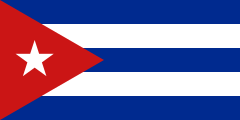Flaga Kuby
 | |
| Informacje | |
| W użyciu |
|
|---|---|
| Proporcje | 1:2[1] |
| Wprowadzona | 20 maja 1902[1] |
| Projektant | Miguel Teurbe Tolón i Narciso López[1] |
| Warianty | |
 | |
| W użyciu | Flaga Prezydenta Kuby |
 | |
| W użyciu | Proporzec marynarki wojennej |
Flaga Kuby, nazywana przez Kubańczyków Bandera de la Estrella Solitaria (hiszp. "bandera samotnej gwiazdy")[2] została zaprojektowana przez redaktora kubańskiej gazety La Verdad ("Prawda"), poetę Miguela Teurbe Tolóna, w 1848 roku. Gwiazda została zapożyczona z flagi Teksasu. Po raz pierwszy flaga w tej postaci została podniesiona 19 maja 1850 roku w mieście Cárdenas, na północnym wybrzeżu Kuby, gdzie generał Narciso López z 600 ludźmi podjął próbę (nieudaną) wyzwolenia kraju spod kolonialnego panowania.
Oficjalnym symbolem Kuby flaga ta jest od chwili otrzymania niepodległości, tj. od 20 maja 1902 roku.
Symbolika
Umieszczony na fladze trójkąt symbolizuje siłę i niezmienność, a także miał odzwierciedlać masońskie wpływy – jest masońskim symbolem równości i braterstwa[1], zaś umieszczona na nim gwiazda, La Estrella Solitaria (Samotna gwiazda), była symbolem niepodległości[1].
Trzy niebieskie pasy odnoszą się do trzech prowincji na Kubie za czasów panowania hiszpańskiego[1].
Barwa biała uosabia czystość patriotyzmu rewolucjonistów[1].
Flaga Kuby stała się inspiracją do zaprojektowania flagi Portoryka.
Flagi historyczne
 Flaga Pierwszej Republiki Kuby (1902–1906; 1909–1959)[3]
Flaga Pierwszej Republiki Kuby (1902–1906; 1909–1959)[3]
Wymiary
Zobacz też
Przypisy
- ↑ a b c d e f g flag of Cuba, [w:] Encyclopædia Britannica [online] [dostęp 2022-09-30] (ang.).
- ↑ Flag of Cuba, www.tripcuba.org [dostęp 2022-08-23].
- ↑ https://thumbs.worthpoint.com/zoom/images1/1/0216/05/cuban-flag-vintage-1940-pre_1_af5fe2b808af826e82e1e3de3c40ba4a.jpg
Media użyte na tej stronie
Vexillological Symbol according to FIAV / W. Smith: National flag and ensign Allowed By WSC Users
Flag of Cuba — construction sheet
Autor: Henrik Hansen, Licencja: CC BY-SA 4.0
Flag of the United States (1896-1908, 3-2 aspect ratio)
Symbol ten oznacza że flaga była niegdyś używana, ale obecnie zaprzestano posługiwania się nią. (flaga historyczna)
Autor: Ningyou., Licencja: CC-BY-SA-3.0
Flag with the cross of Burgundy (saltire). Also named Cross of Burgundy flag. It was used in the Catholic Monarchy and in its viceroyalties such as New Spain and Peru. It was also used by Spain as a military or king flag. Used by the Carlist movement.
Autor: HapHaxion, Licencja: CC0
Flag used by Carlos Manuel de Céspedes in the "Grito de Yara" uprising of October 10, 1868. The flag was then used during the Ten Years' War by Cuban pro-independence fighters, and was later adopted as the flag of the cities of Bayamo and Yara. Based on https://www.crwflags.com/fotw/flags/cu_ces.html#mus. Also known as the flag of La Demajagua or the 10 October flag.
Flag of the Prime Minister of Cuba (1959-1976)
Flag of Cuba before its light blue stripes were changed to a darker shade.
Autor: previous version User:Ignaciogavira ; current version HansenBCN, designs from SanchoPanzaXXI, Licencja: CC-BY-SA-3.0
Flag of Spain (1785-1873 and 1875-1931)
Cuban "flag of Yara", "Céspedes flag" or "flag of La Demajagua", it was one of the two flags used during the first independence war; the other one became the official Cuban flag; while this one is hoisted "wherever the legislators of the Cuban people meet"; in particular it is displayed, along the national flag, in the National Assembly. See also: http://www.nacion.cult.cu/en/yara.htm
Flag of the President of Cuba
Autor: Ignacio Gavira (original image), B1mbo (modifications), Licencja: CC BY-SA 2.5
The flag of the First Spanish Republic (1873–1874).




![Flaga Pierwszej Republiki Kuby (1902–1906; 1909–1959)[3]](http://upload.wikimedia.org/wikipedia/commons/thumb/f/ff/Flag_of_Cuba_%28sky_blue%29.svg/120px-Flag_of_Cuba_%28sky_blue%29.svg.png)


















